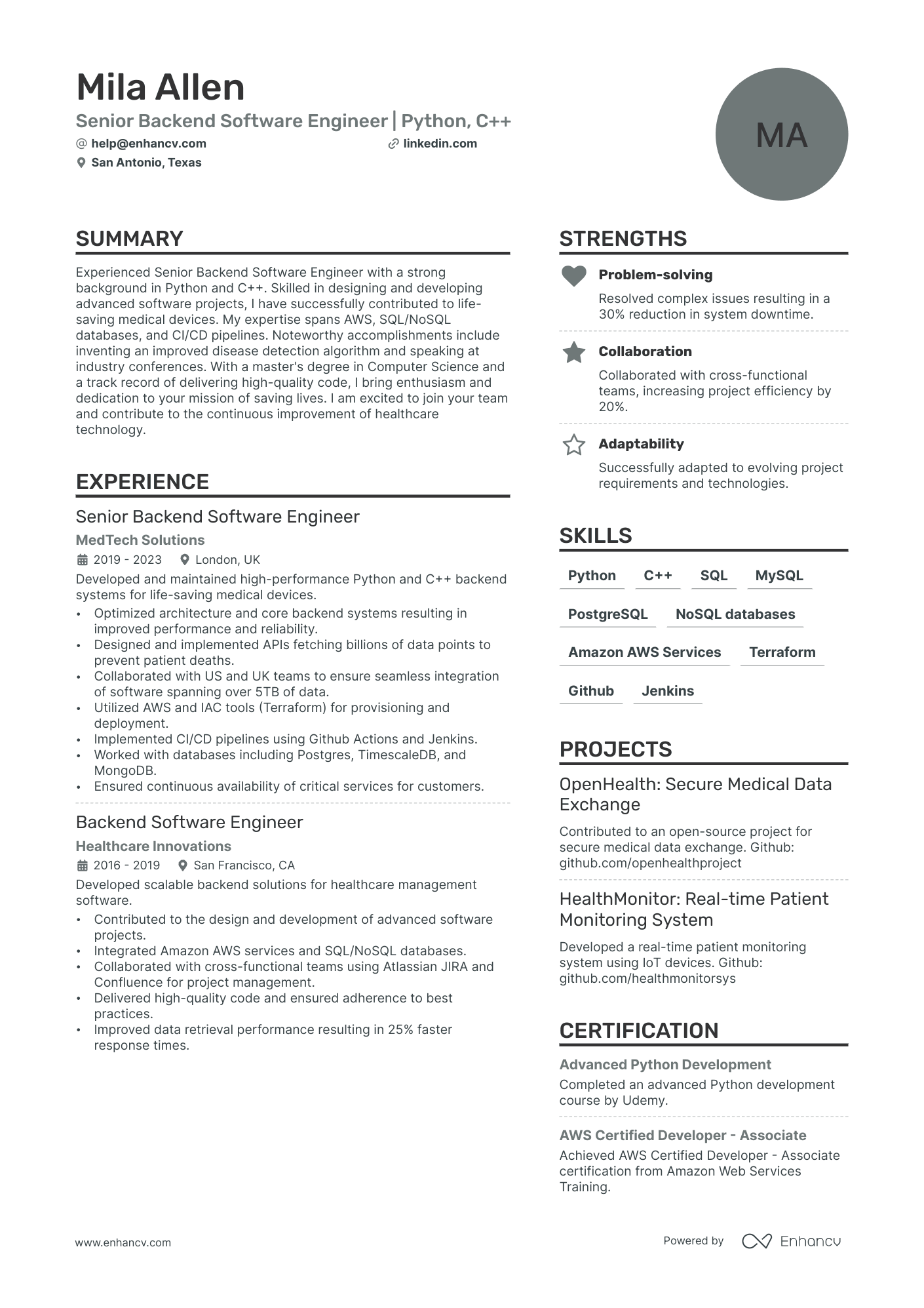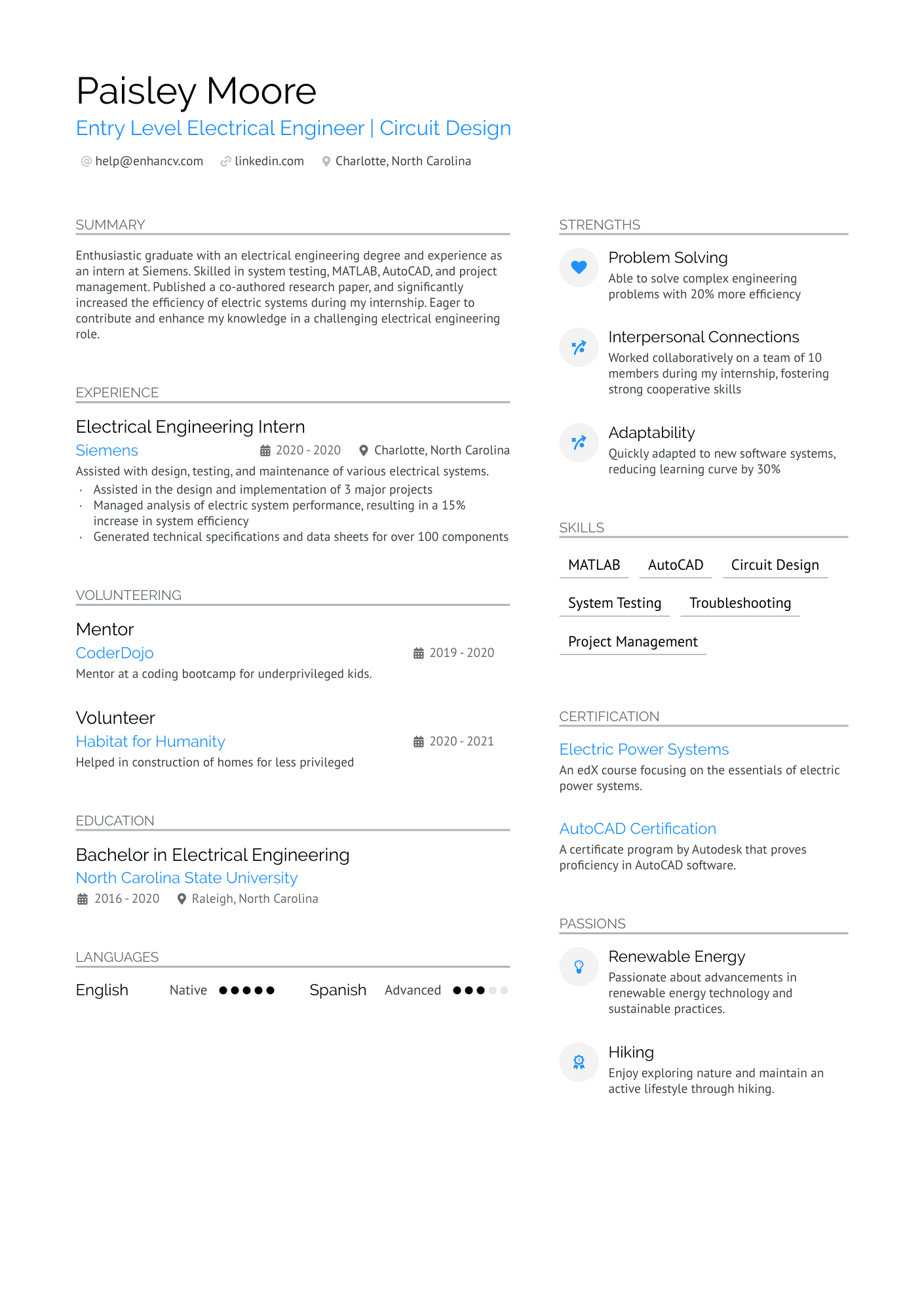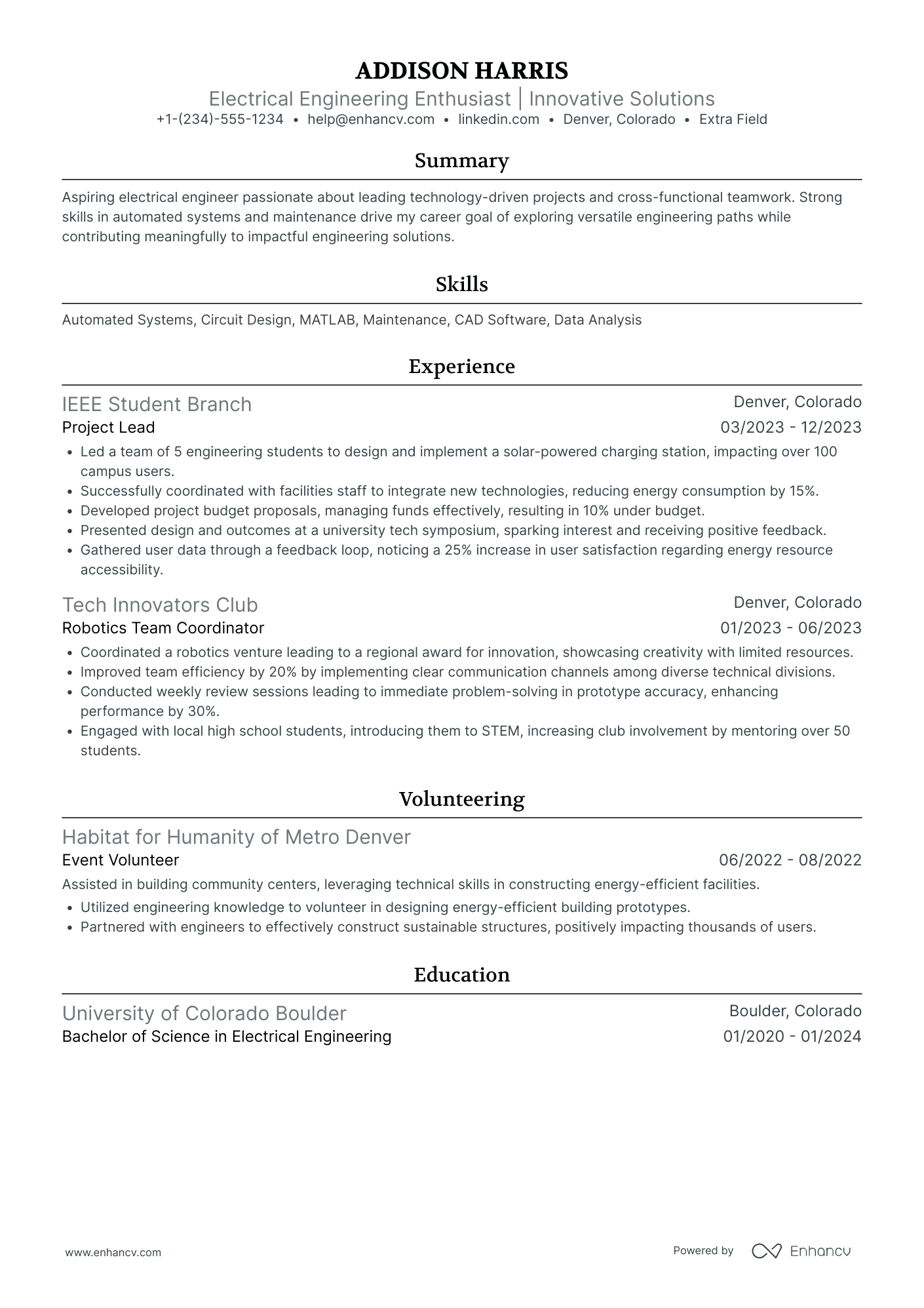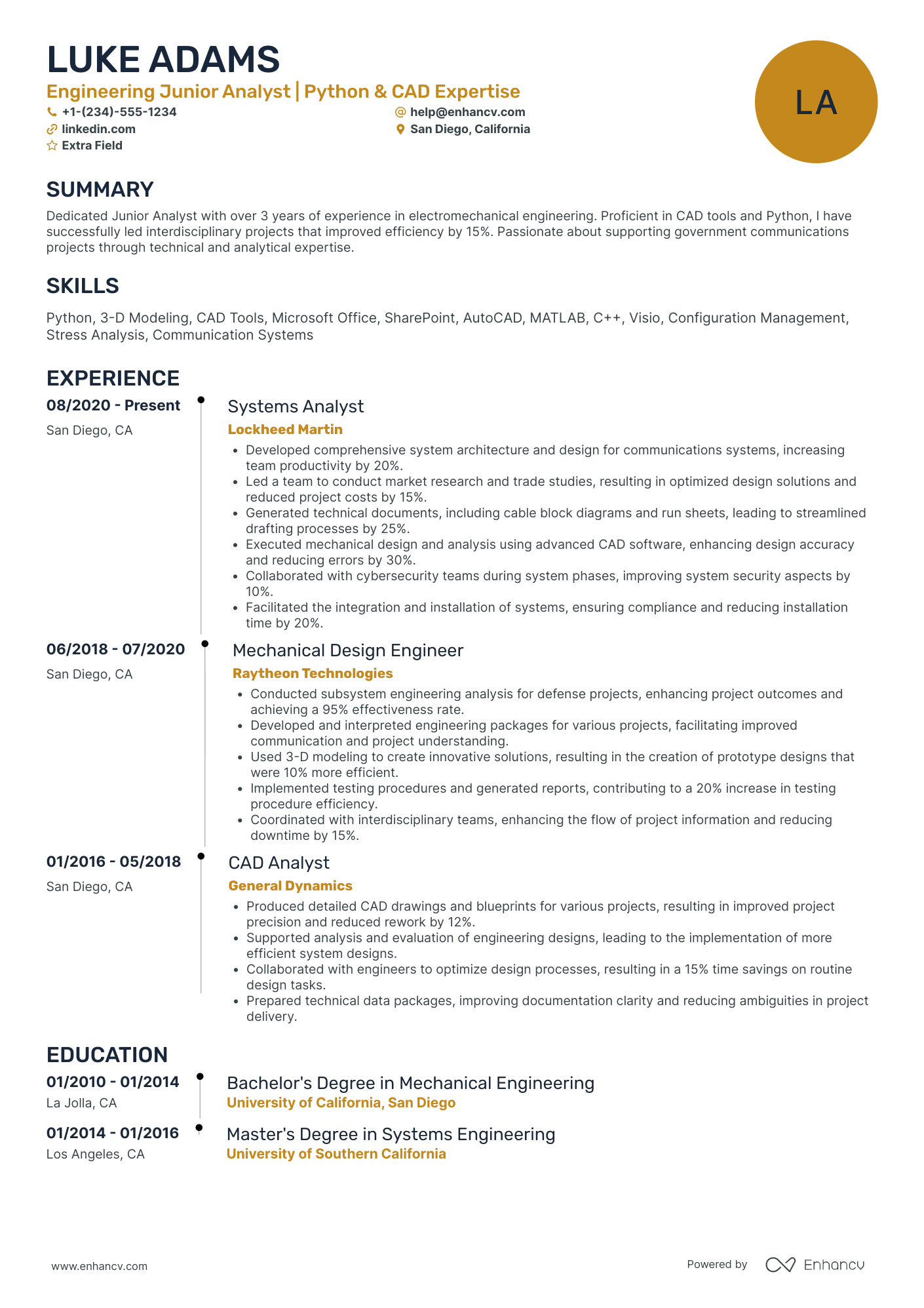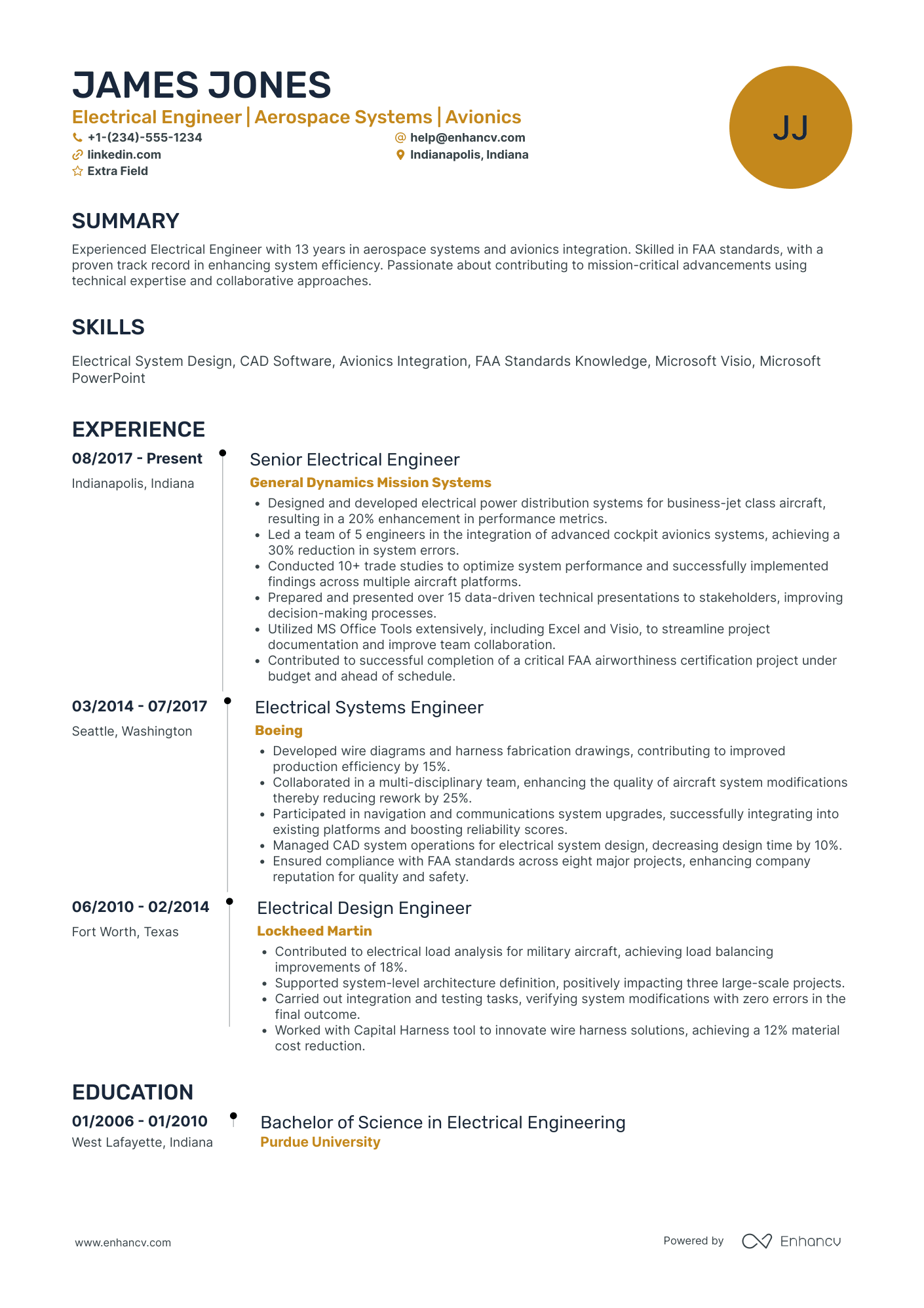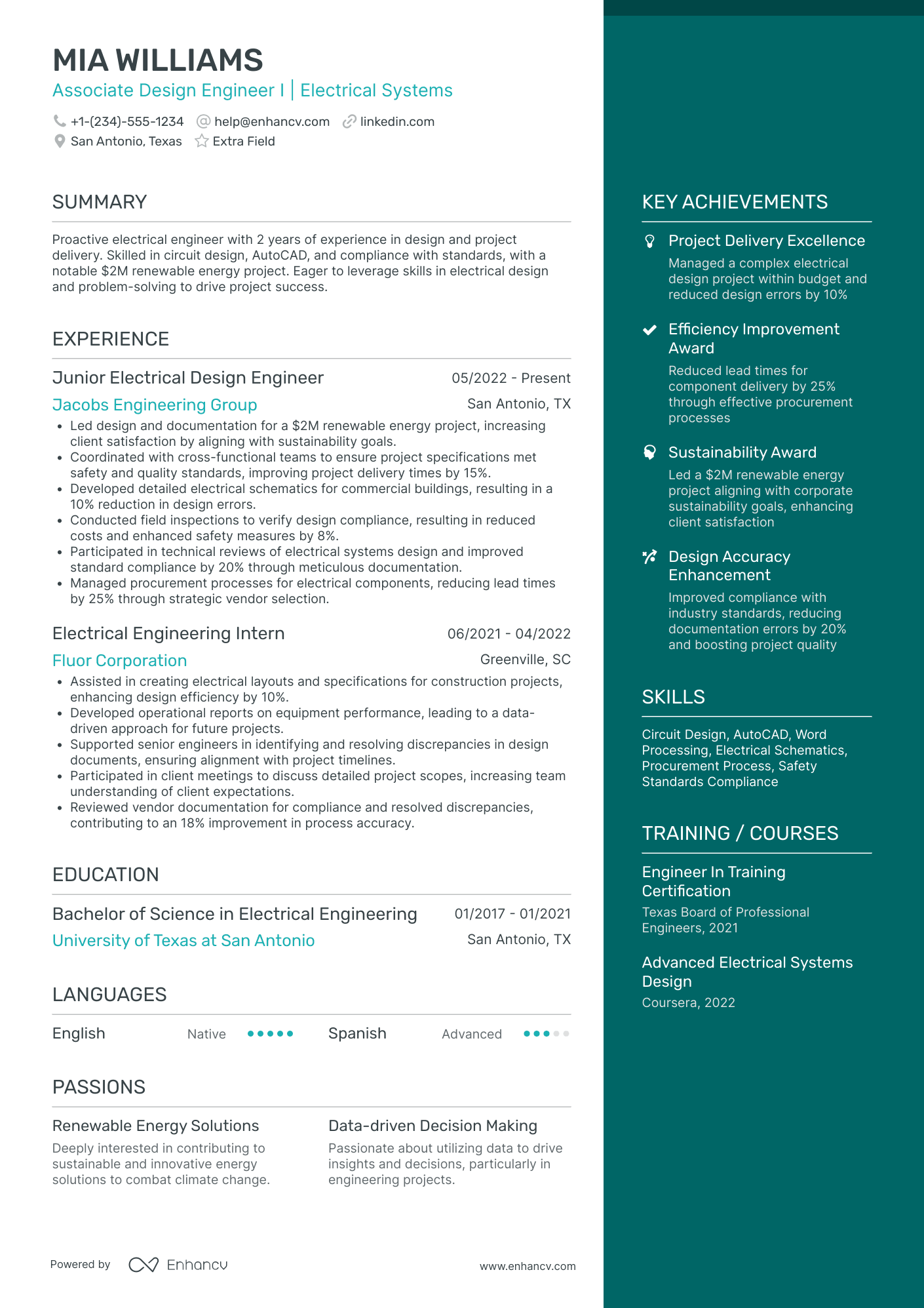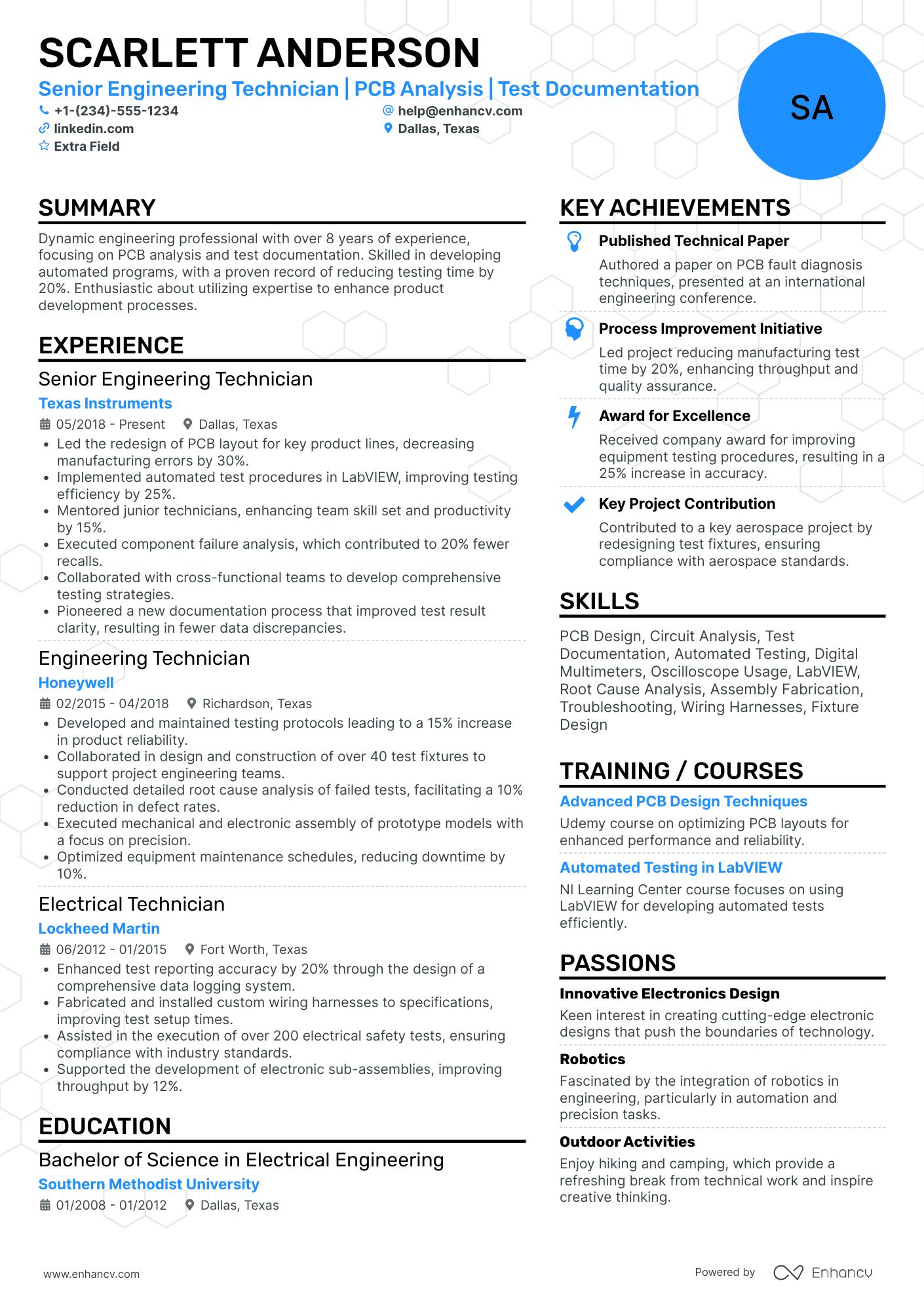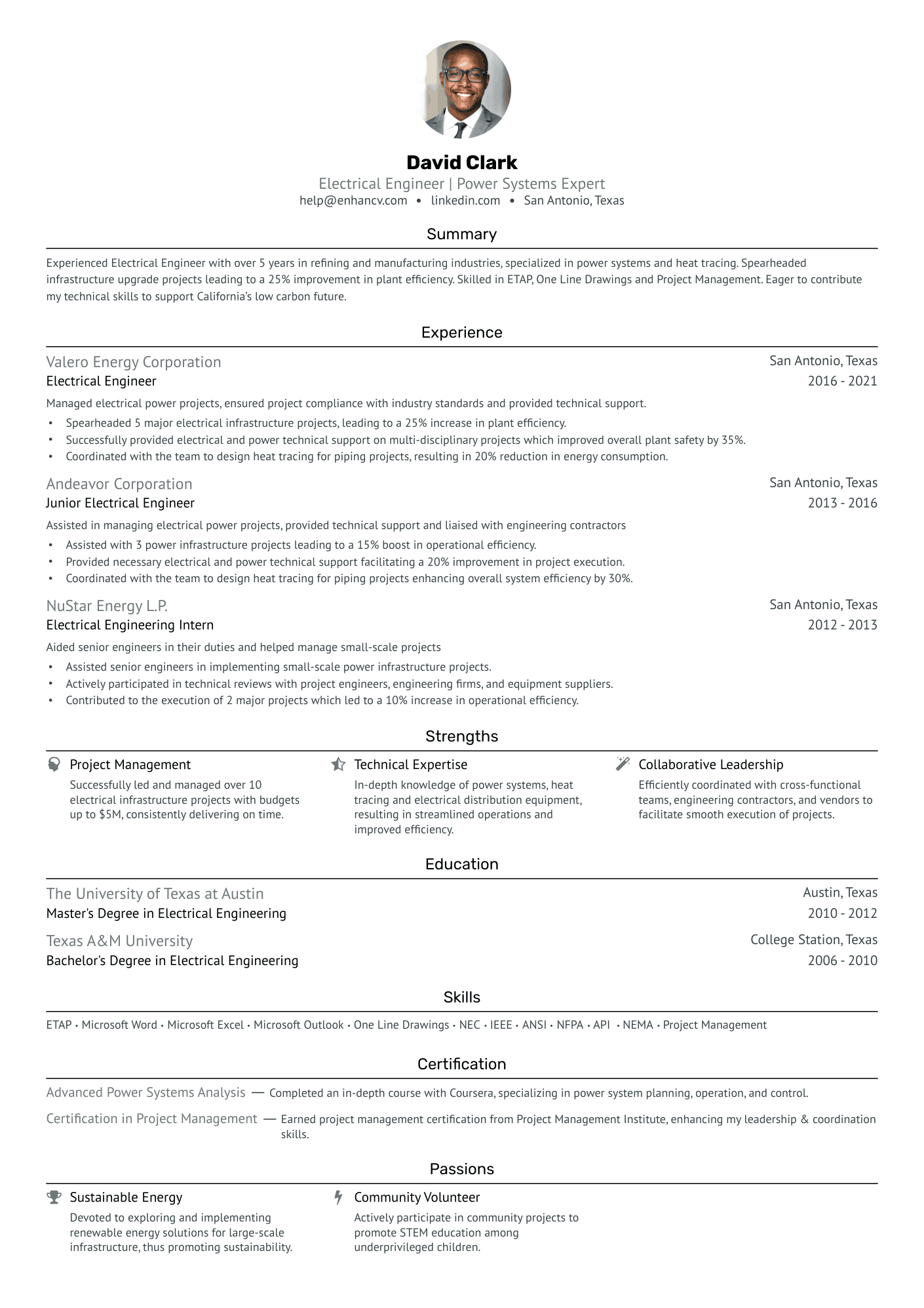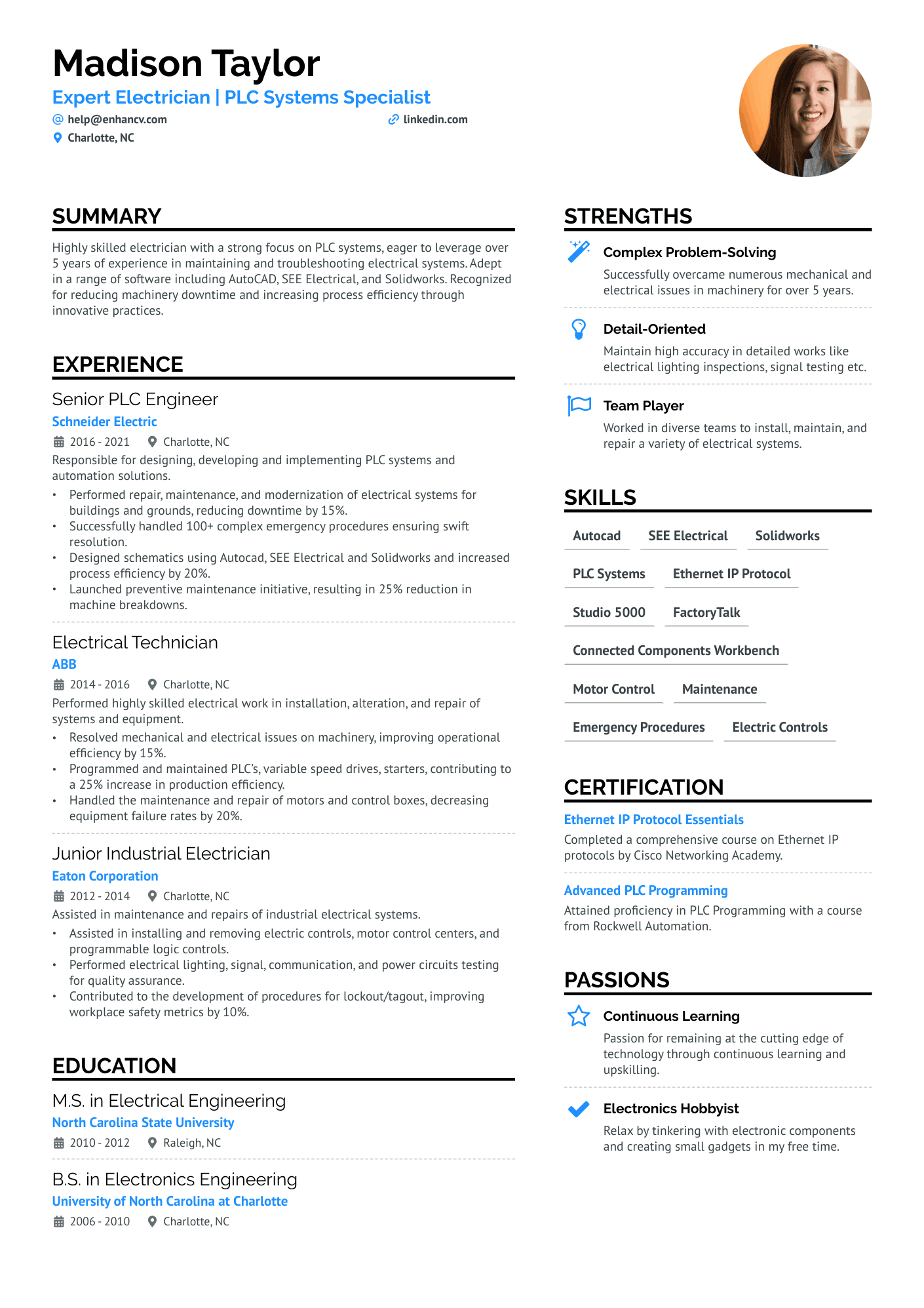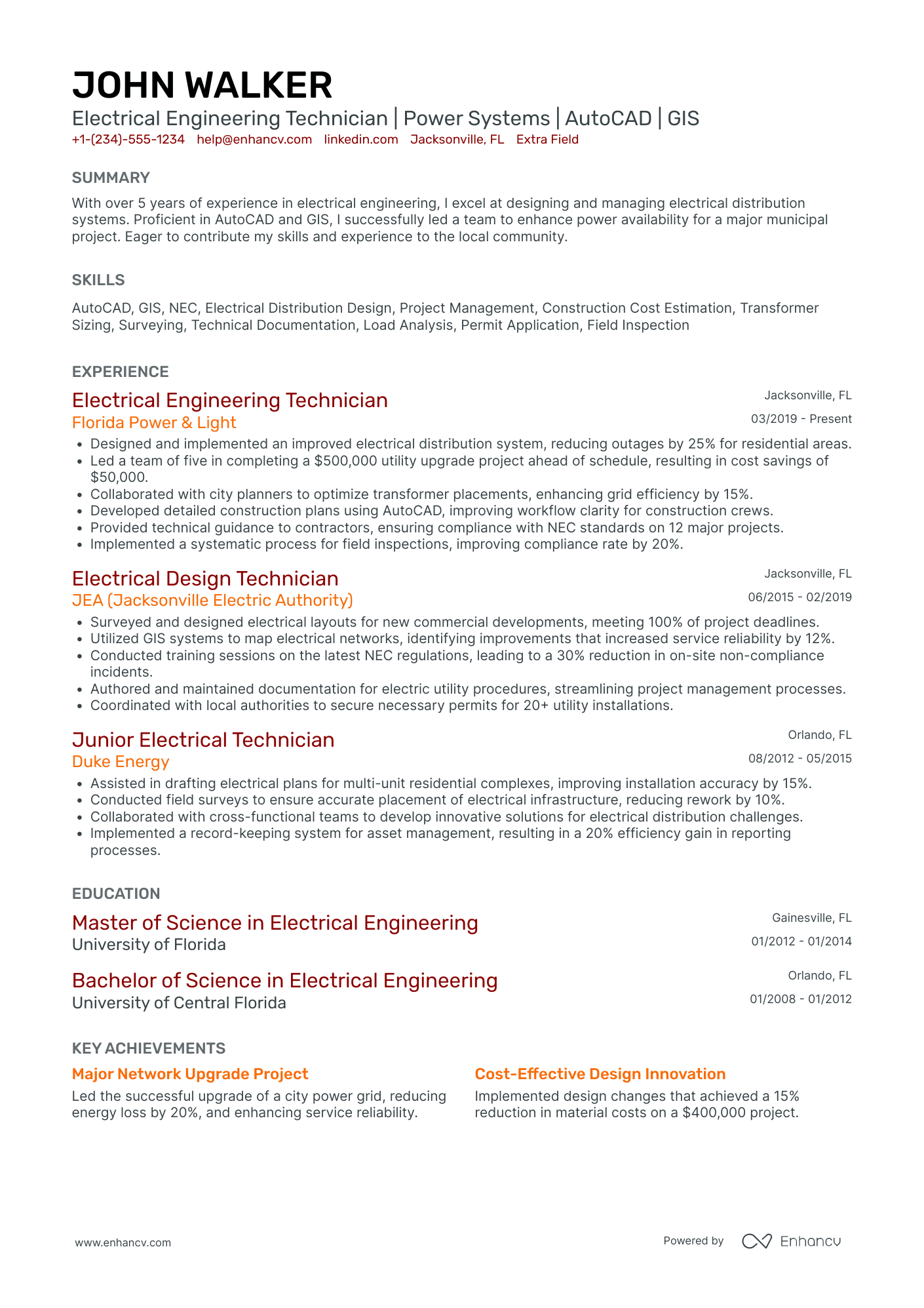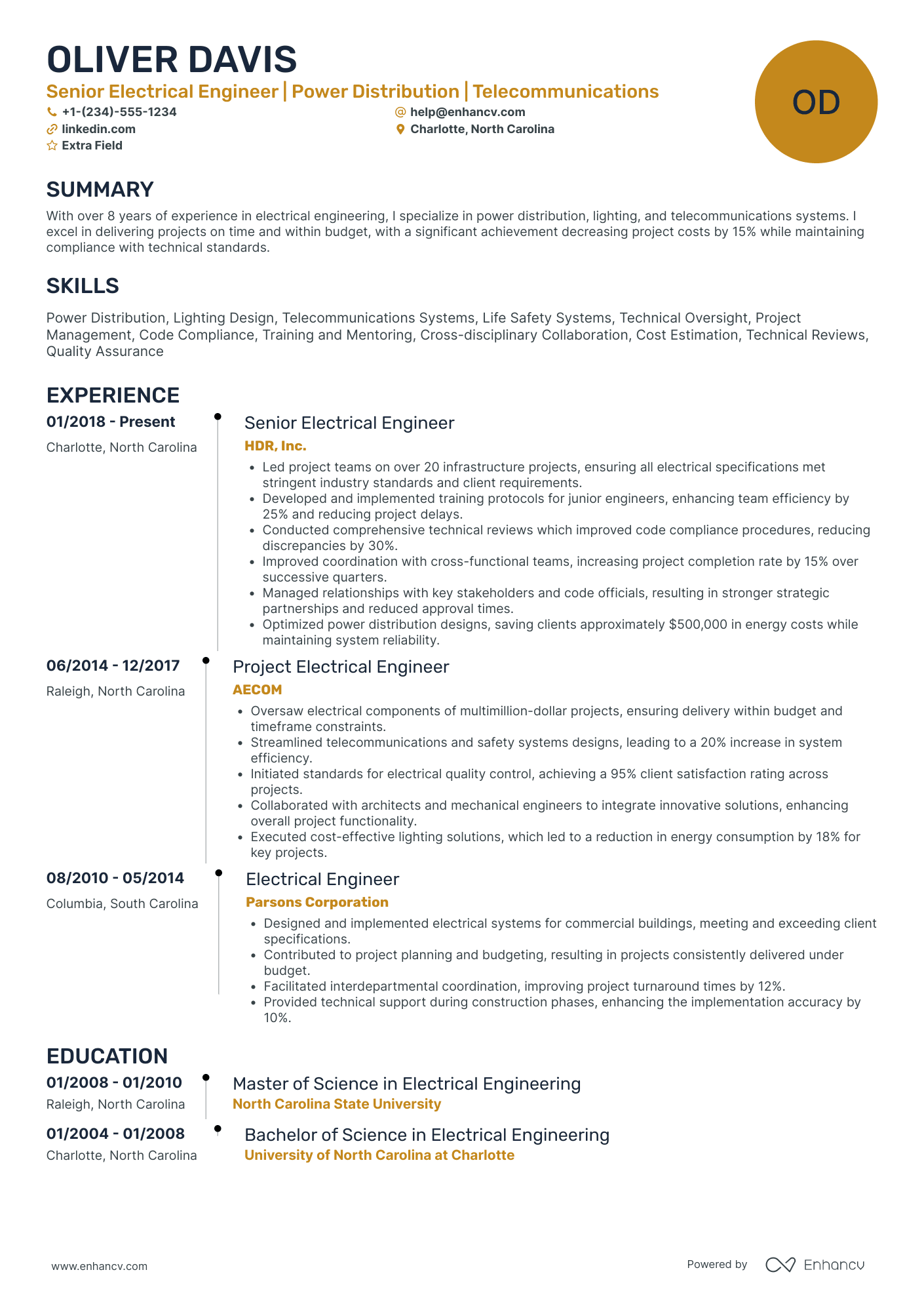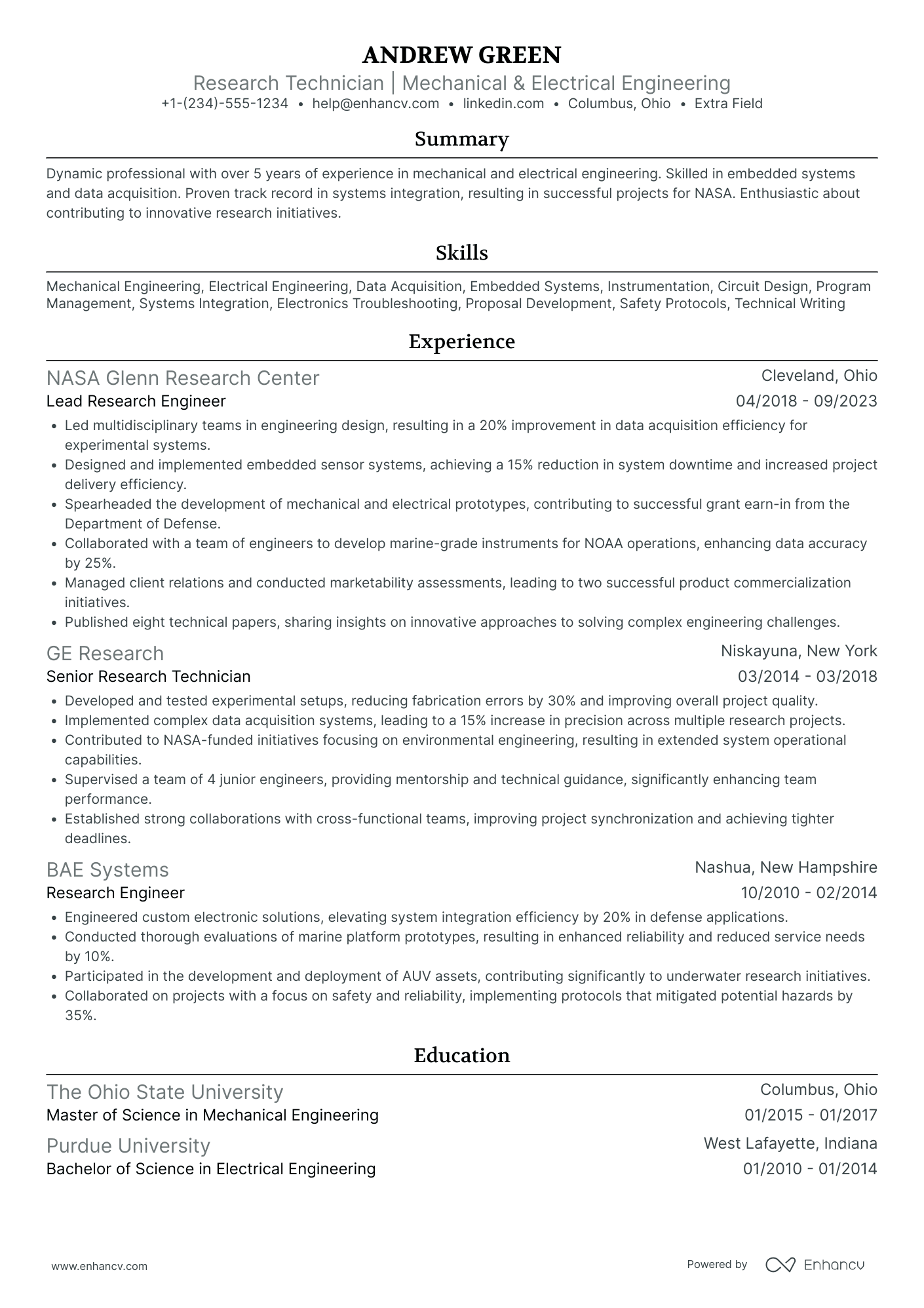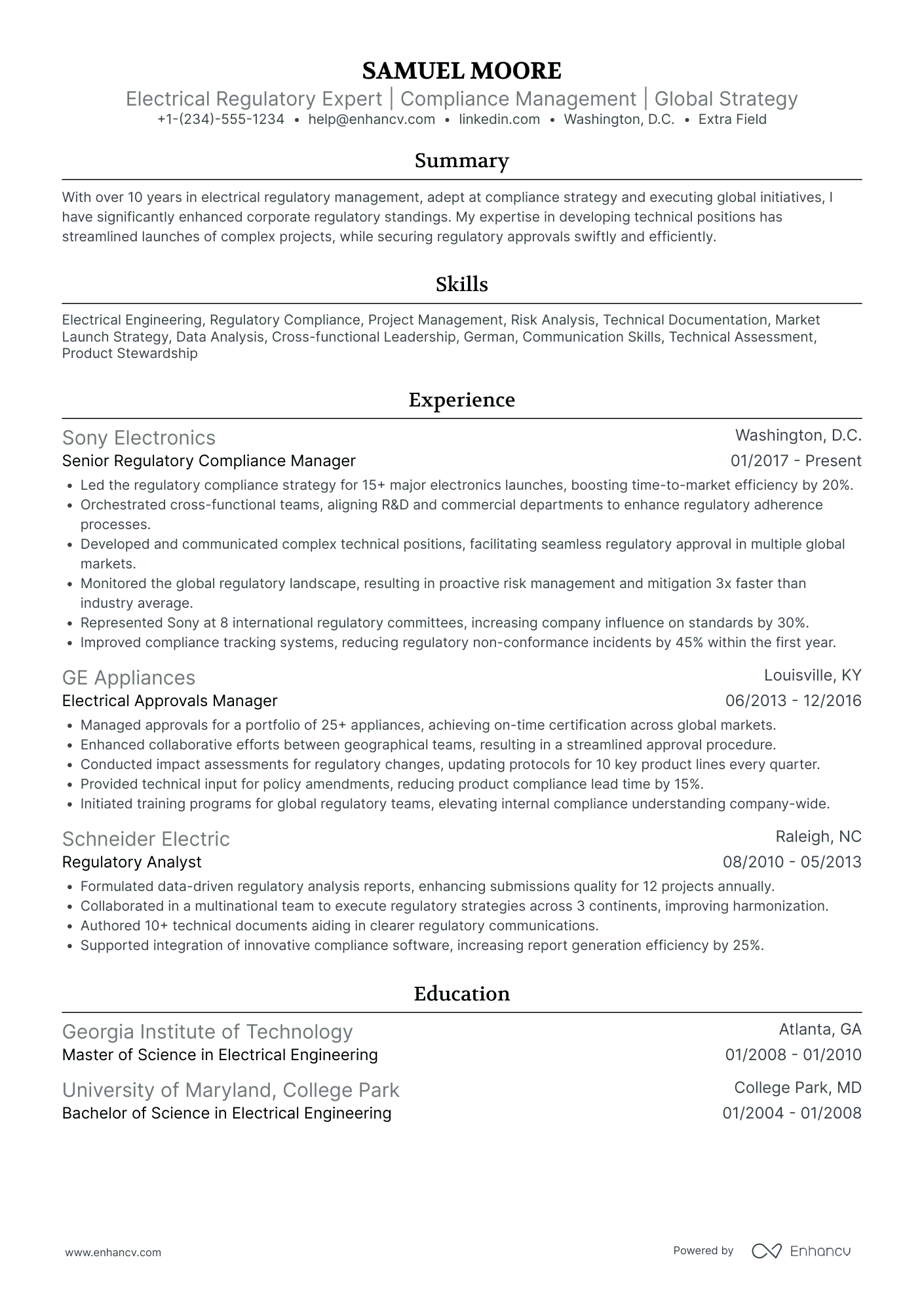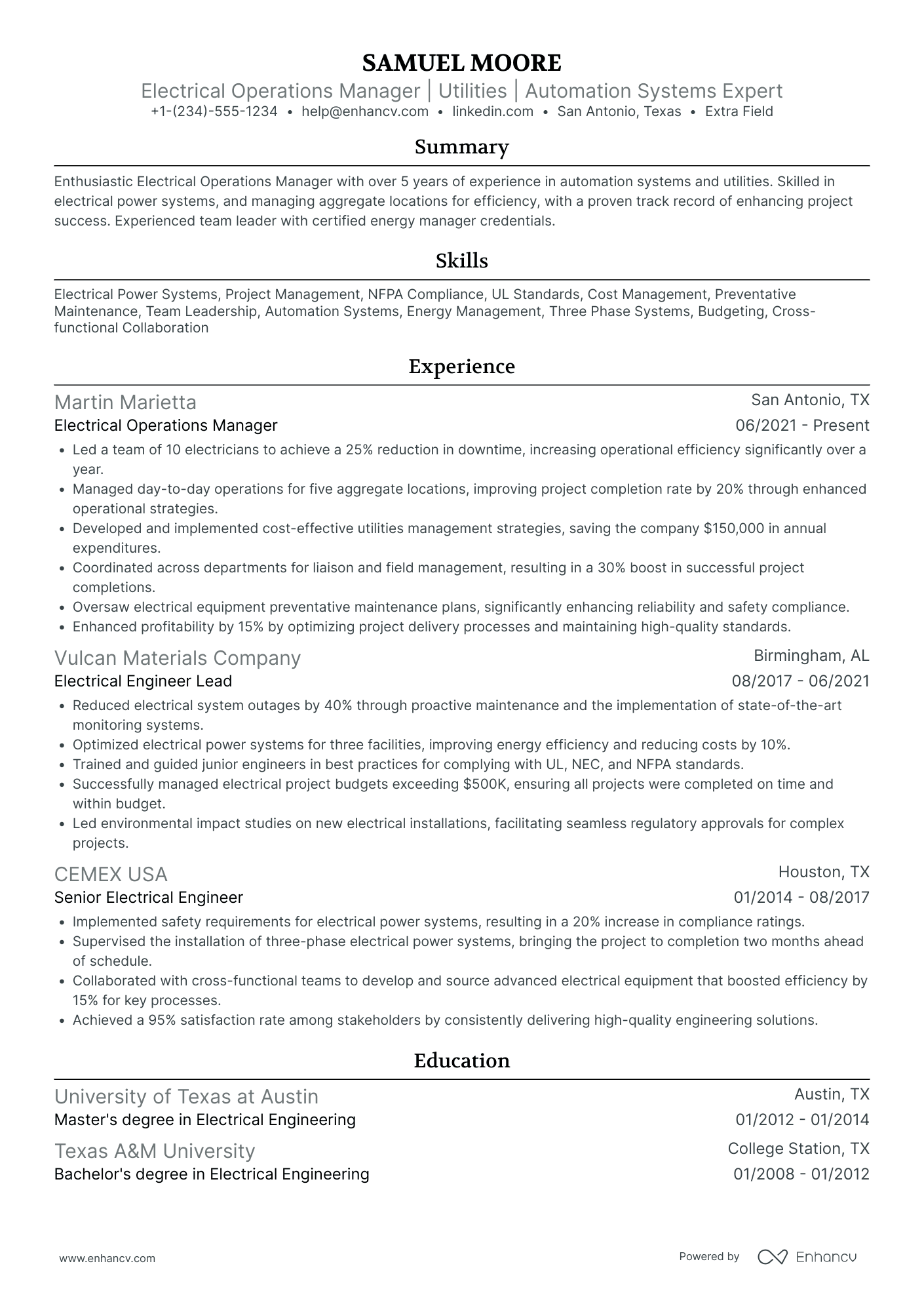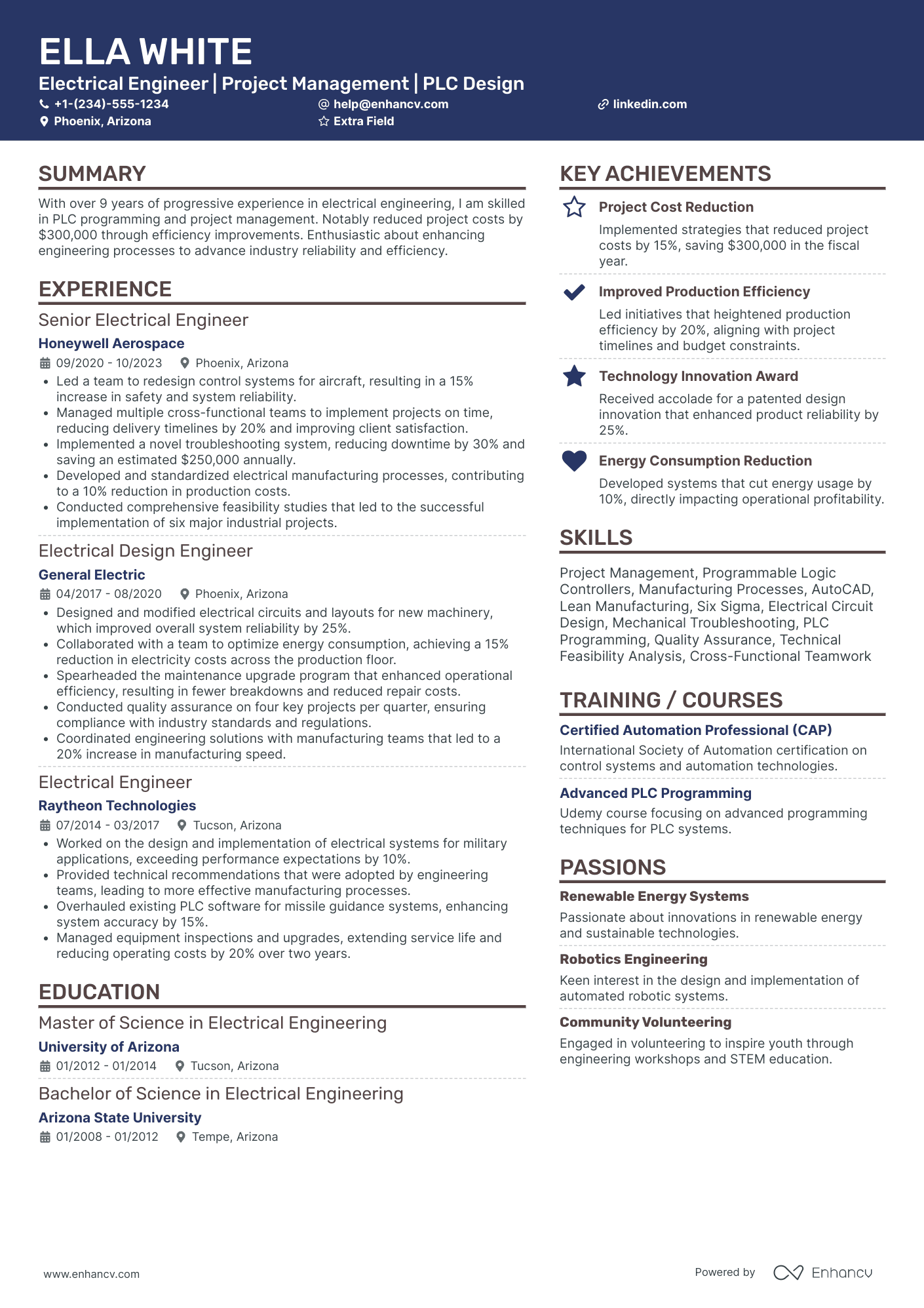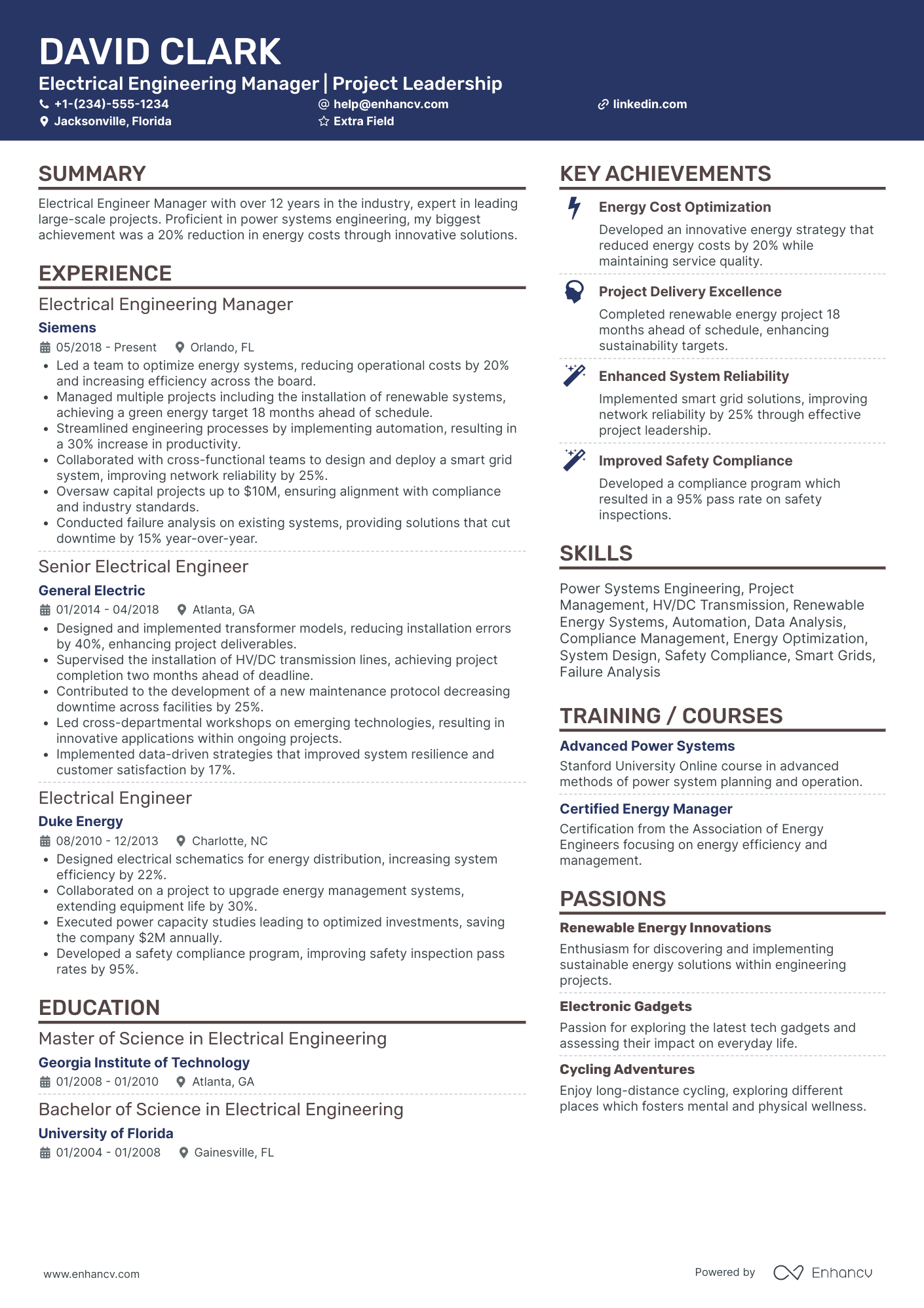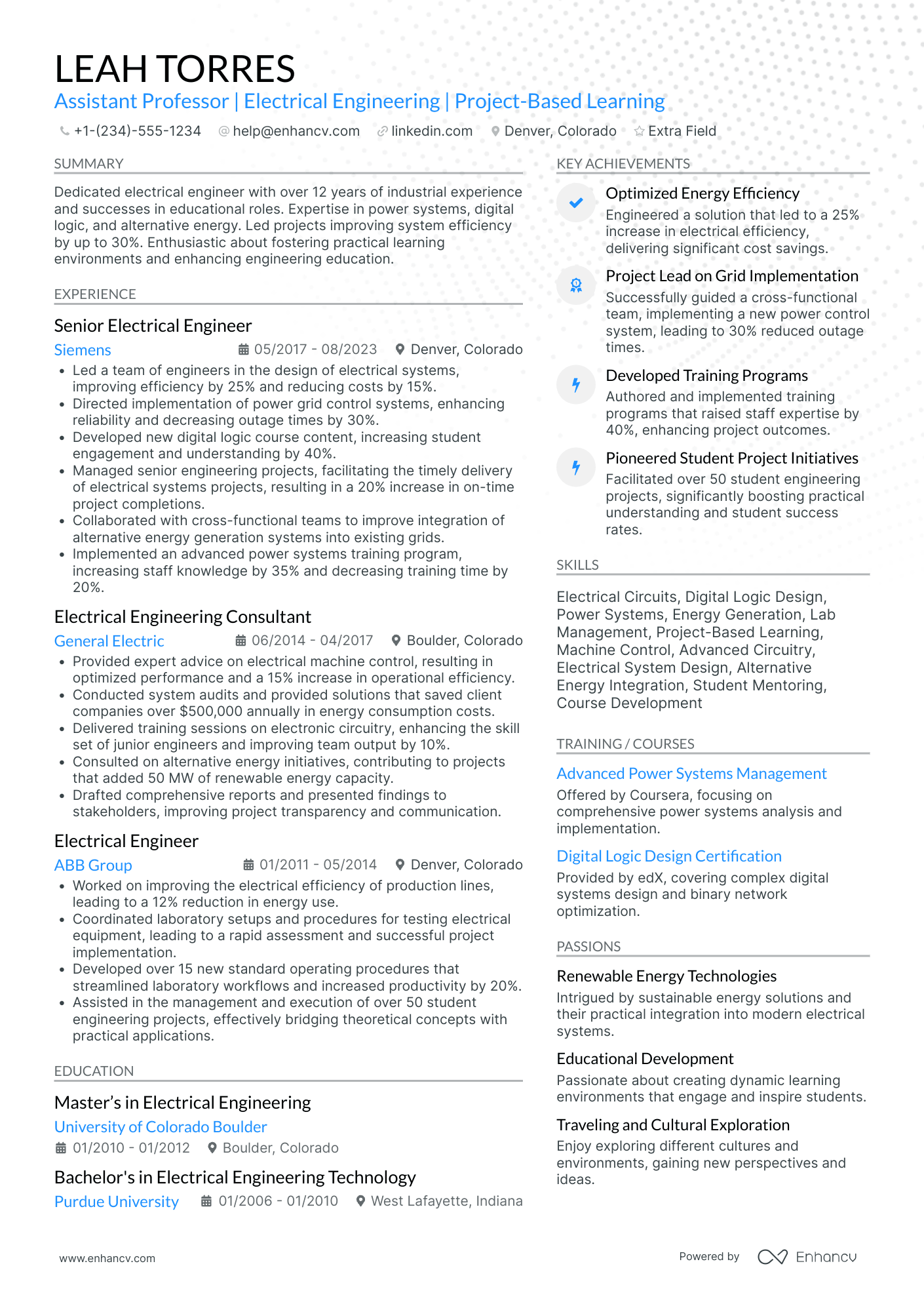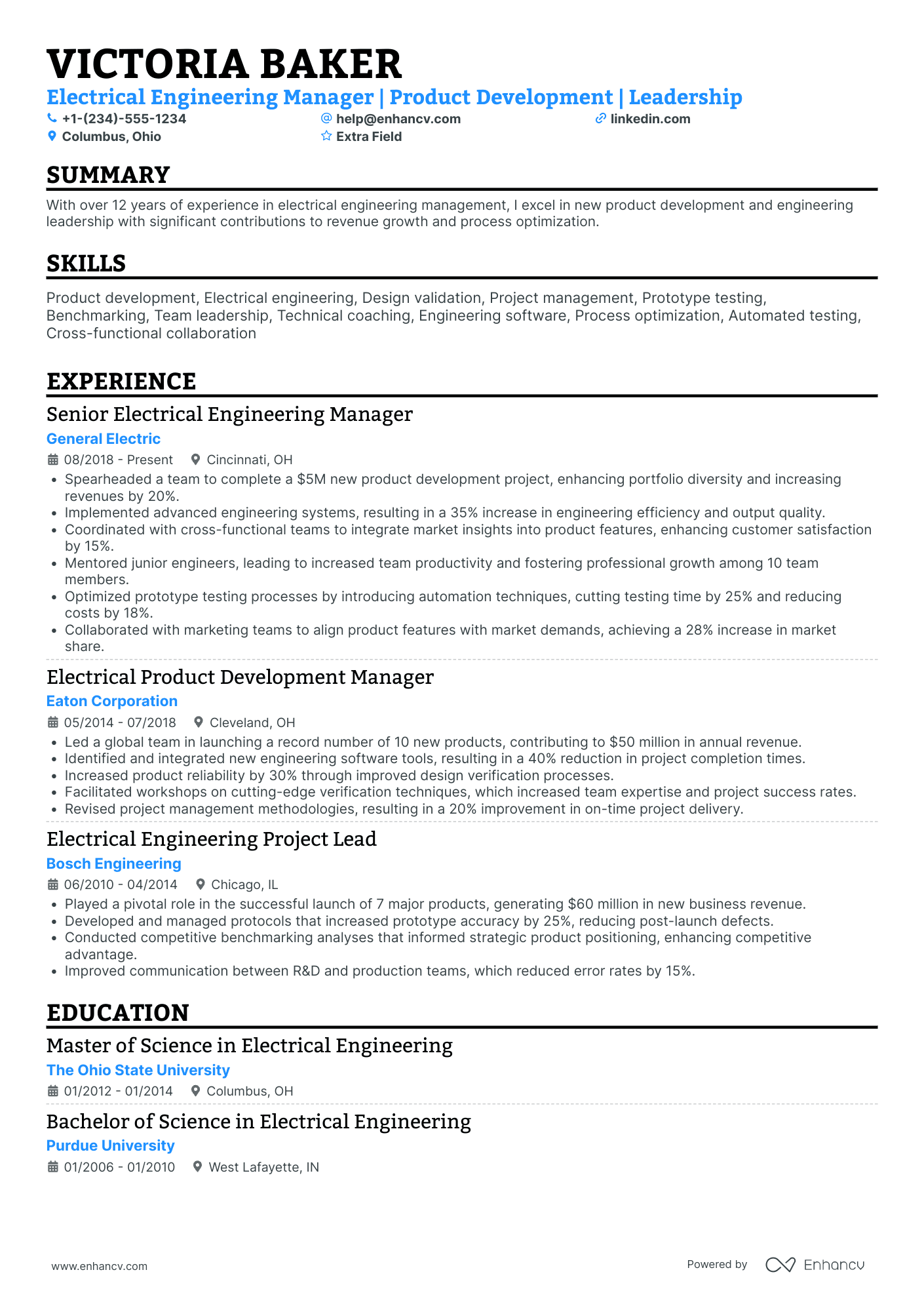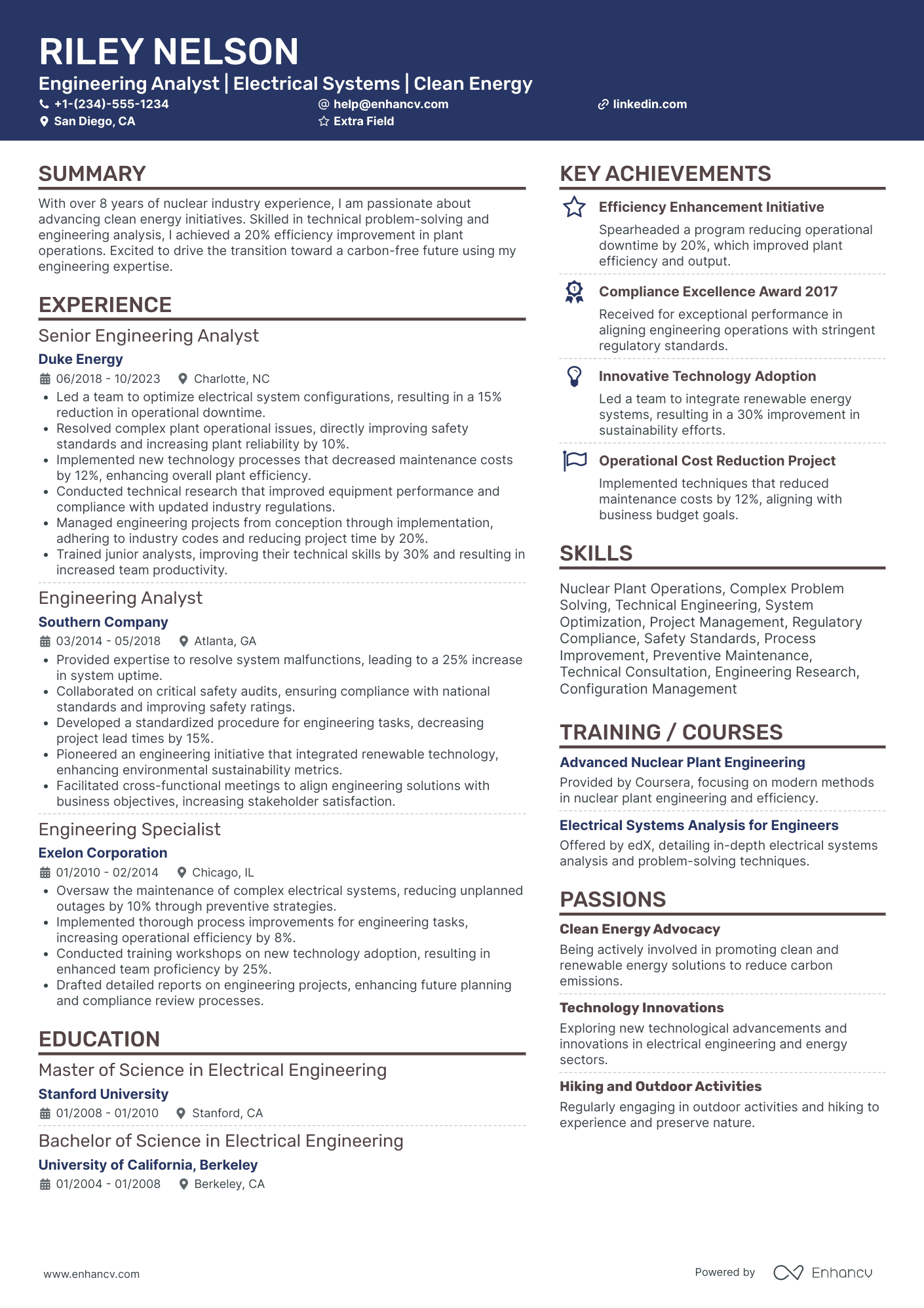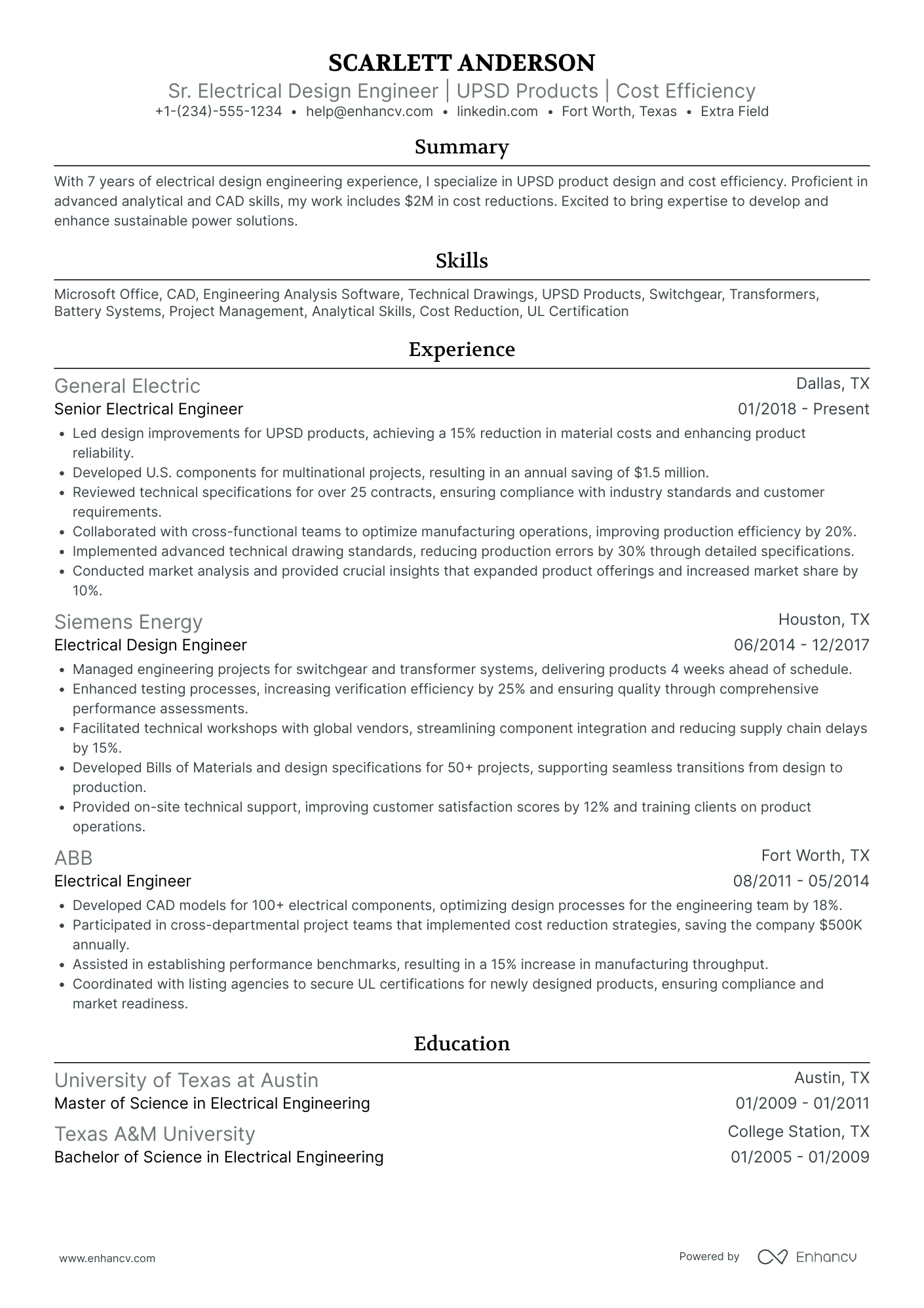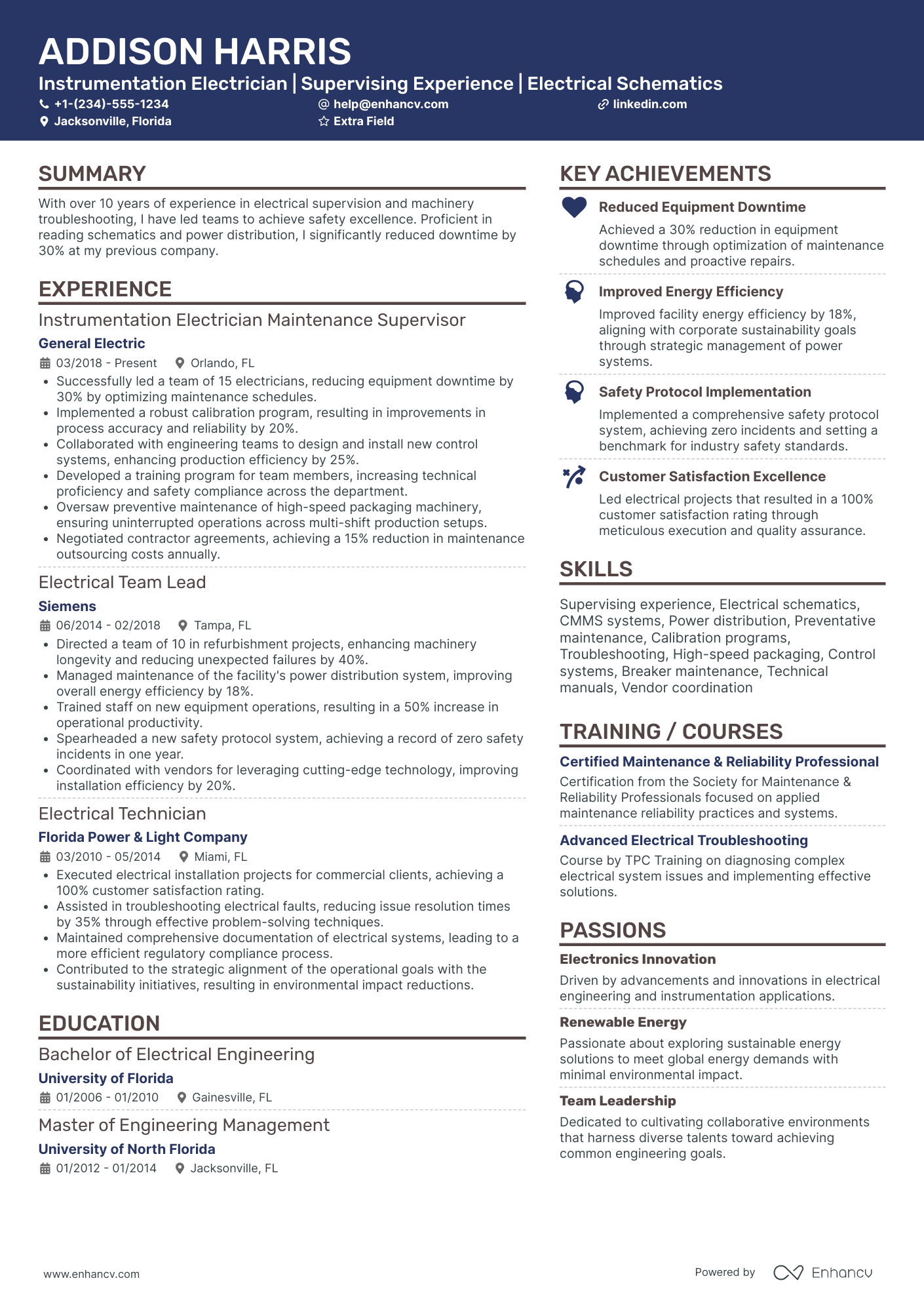Electrical еngineers seem to be running the world these days. From hair dryers to smartphones, telecommunication, transportation to power generation, transmission, and everything in between. It’s no exaggeration to say electrical engineers help build our modern world.
We continue to progress towards a digital future, so electrical engineering remains a profession with increasing demand and diversification. In fact, employment of electrical and electronics engineers is projected to grow 7% from 2022 to 2032, faster than the average for all occupations.
Crafting your electrical еngineering resume is complicated because the field is broad, but job offers are usually specific. One of the major difficulties electrical engineers face when applying for jobs is keeping their resume relevant to each position.
Fear not! The following guide will teach you how to put together an effective electrical engineering resume and bring a positive impression to your employers.
Key takeaways
- Your work history will be comprehensible and easy to scan with the reverse-chronological format.
- Your resume design can shed light on your strengths, so choose a clean layout with subtle colors and modern fonts.
- Pepper your experience with measurable results, and tell the story behind them, to give recruiters an engaging preview of your achievements.
- Outline your hard skills in a separate section, and intersperse your people skills in your experience to give them more depth.
- A strong educational background is paramount to an electrical engineering position. Write it well to impress recruiters. Think of additional certifications to show, too!
- Don’t miss out on additional sections such as engineering projects you’ve worked on in your spare time.
Let’s look at a sample resume for an electrical engineer. Then, you can easily visualize what you need on your own.
Electrical engineering resume sample
This sample includes all the key sections of an electrical engineer resume.
Carla Jensen
Electrical Engineer
carlajensen@email.com | LinkedIn | Seattle, WA
Summary
Highly skilled Electrical Engineer with over 5 years of experience in developing, testing, and managing the manufacturing process for electrical devices. Proficient in design software for producing schematics and overseeing the installation process. Dedicated to ensuring safety and efficiency in all projects.
Experience
Electrical Engineer
Tech Innovators Inc., Seattle, WA
June 2019 – Present
- Developed electrical devices and systems, ensuring compliance with safety and efficiency standards.
- Managed the manufacturing process for new electrical equipment, coordinating with cross-functional teams.
- Utilized design software to produce detailed schematics and blueprints.
- Oversaw the installation process, ensuring proper implementation and functionality.
Junior Electrical Engineer
FutureTech Solutions, Seattle, WA
August 2016 - May 2019
- Assisted in the development and testing of electrical devices.
- Supported the manufacturing process, ensuring adherence to quality standards.
- Collaborated with senior engineers to produce design schematics.
- Participated in the installation and troubleshooting of electrical systems.
Education
Bachelor of Science in electrical engineering
University of Washington
Graduated: 2016
Certifications
- Professional Engineer (PE) License
- Certified Automation Professional (CAP)
Skills
- Electrical Device Development
- Safety and Efficiency Testing
- Manufacturing Process Management
- Design Software (AutoCAD, MATLAB)
- Schematic Production
- Installation Process Oversight
Languages
- English (Native)
- Spanish (Conversational)
Now, let’s break down the elements of a successful resume, one by one. Starting with formatting.
How to format an electrical engineering resume
Think of the right resume format as the switch of an electric system. It should be easy to use, intuitive, and bring what’s needed to light. Use a resume template that would do just that—put your best qualities into the spotlight!
Take a look at our tips:
Resume format:
The reverse-chronological format is a timeless classic, and classic bodes well with engineering, don’t you think? It provides an orderly list of your work endeavors so far and begins with the most recent one for optimal reading experience.
Resume designs
- Less is more when applying for a job, and a 1-page resume captures this goal perfectly. Opt for 2 pages only if you’ve got extensive experience.
- Our resume builder ensures your margins stay within the preferred 0.5”—1” scope. Any less, and it’ll be hard to read, anymore, and your experience will look sparse.
- A two-column layout provides space for all the important info you want to feature and is easy to scan.
- A little color goes a long way to accentuate your best features.
- Choose fonts such as Arial, Rubik, or Lato to maintain a professional appearance suitable for an electrical engineering role.
Contact information
Your resume header will probably be the first thing hiring managers see. Мake sure it contains all the essentials: a name, job title, and contact information. A photo is generally not needed, as it can cause bias. Always check with the job description, though!
Consider your target market – resumes in Canada, for example, follow different layout conventions.
PRO TIP
Contrary to popular belief, our tests showed that fonts, colors, columns, and resume length don’t affect ATS (Applicant Tracking Systems) parsing. Focus on matching job description language and formatting details like dates and bullet symbols as those may affect your application.
File formatting
A PDF format will ensure all the elements of your chosen resume layout stay in place. You can name your file using this formula: FirstName_LastName_JobTitle.
Top sections on a resume
Here’s a list of the top resume sections:
- Work experience
- Skills
- Education
- Summary/Objective
- Additional sections
We’ll discuss them in more detail below.
Have you tried the Enhancv resume builder? It guarantees your resume comprises all the key sections.
Is your resume good enough?
Drop your resume here or choose a file. PDF & DOCX only. Max 2MB file size.
We’ve got the design covered, now let’s move on to your strongest suit—your experience.
How to write your electrical engineering resume experience
The great thing about electrical engineering is you can see the direct results of your work—and others can, too! Why not use these examples to make your resume experience tangible?
Key components of an experience section
Make sure your experience section lists:
- The companies you worked for, your roles, and the period you spent there.
- The purpose, your contributions, and the outcomes of the projects you worked on.
- Specific technical skills and tools you used (e.g., AutoCAD, MATLAB, PLC programming. etc.).
- Quantifiable achievements. We’ll discuss this in more detail in a second.
Tailor your experience to your resume
Be strategic about your electrical engineer experience. Select keywords from the job description and include them in your resume summary or experience section—these will signal to recruiters you’re a good fit for the position. What this does is tailor your resume to the job posting. The more relevant your application is, the higher your chances of scoring an interview.
Let’s take a look at a real electrical engineer job description.
Electrical engineer
Company profile
The Corporate Real Estate Operations group is responsible for day-to-day facilities operations, capital planning, and engineering operations of owned and leased facilities to ensure business is conducted in a clean, safe, and efficient work environment. We ensure that the value of the company’s physical assets is protected and improved, adhering to the highest level of engineering standards!
Responsibilities
- The position objective is to provide engineering services to in-house project teams, clients, and third-party consultants as it pertains to the design, development, testing/fixing, documentation, programming, and sustaining of all electrical and critical power systems throughout the portfolio.
- Partner with third-party MEP consultants in regard to electrical design/power calculations/facility resiliency and system redundancy.
- Assist in critical system design (studios/broadcast spaces/data centers, etc.).
- Develop, review, and interpret electrical drawings to support projects.
- Recommend and implement engineering changes to accommodate BU requirements.
- Provide technical support for capital improvements and forecast expense and capital budgets regarding the service contracts and end-of-life capital predictive maintenance.
- Review new project designs for alignment with the Company’s Energy Goals.
Required qualifications & skills
- 3+ years of confirmed experience in electrical engineering or equivalent
- Strong communication and presentation skills, both with internal staff and with outside entities (e.g. Studio, Walt Disney Imagineering, Vendors)
- Detail orientation and ability to work under deadlines/short notice and to address problems quickly
- Electrical system design and experience in Utility, Critical Power Plants, and Lighting Controls
- Knowledge in instrumentation (electronic devices, power supplies, relays, contact blocks), start-up, and commissioning of electrical systems
- Strong digital literacy - MS Office Suite, AutoCAD, and Bluebeam REVU.
Here’s an example experience entry tailored to that same job description (we’ve bolded the sections we’re targeting in the job ad):
- •Provided engineering services for electrical and critical power systems across a portfolio of corporate properties.
- •Partnered with third-party MEP consultants on electrical design, power calculations, and ensuring system redundancy for enhanced facility resiliency.
- •Assisted in the design of critical systems including studios, broadcast spaces, and data centers, ensuring all electrical requirements were met.
Here’s why this section works:
- Aligns with job responsibilities: The experience entry mirrors the specific duties and responsibilities outlined in the job description, demonstrating direct relevance and applicability to the desired role.
- Highlights key skills: By explicitly mentioning skills such as electrical system design and partnership with third-party consultants, the experience entry showcases the candidate's technical proficiency and preparedness for the role.
- Fieldwork capability: Including the design of critical systems such as studios, broadcast spaces, and data centers emphasizes the candidate's practical experience and adaptability to the specific demands of the job.
The most effective way to describe your experience is through real results. Let’s see how to quantify your achievements.
How to quantify your experience on a resume
Quantifiable experience is crucial for an electrical engineer. Engineering employers prioritize candidates who show proven success through concrete data, as it clearly evidences competence, efficiency, and problem-solving skills.
For instance, instead of saying "Improved the efficiency of a power system," you might say, "Enhanced the efficiency of a power distribution system by 20%, resulting in a cost savings of $50,000 annually." This example underlines the technical improvement made and translates it into financial terms, making it more impactful and understandable to hiring managers and non-technical stakeholders.
Here’s how you can quantify your achievements
- Add any specific improvements you’ve made to the electrical system's efficiency at your past job, using percentages to show the impact.
- Quantify how many engineering designs or drafts you completed or contributed to during your career.
- Include the number and types of electrical equipment you've managed or been responsible for maintaining.
- Specify any cost reductions you've achieved in previous projects, indicating how much money you saved the company.
- Indicate how many safety standards or protocols you've implemented or contributed to, showing your impact on ensuring safe practices in your work environment.
Being inexperienced can be scary but we’ve got you covered with some tips.
How do i write an electrical engineering resume with no experience
It’s perfectly understandable to be inexperienced at the beginning of your career. What’s important is your willingness to learn and focus on your strengths.
Focus on your skills, education, and projects/volunteering:
- Your education is integral in your electrical engineering career, so list a relevant degree, high GPA, and other academic accomplishments.
- Think of what transferable skills you’ve got, such as communication, teamwork, attention to detail.
- Avoid the rookie mistake of not participating in projects or volunteering. Engaging in such activities demonstrates your eagerness to contribute and grow professionally. For example, volunteering as a STEM mentor, conducting workshops, and guiding students through projects, are all activities enhancing teaching and leadership skills. These are qualities that employers will highly appreciate.
Don’t just take our word for it. Here are a few specific tips on how to approach this section, according to the advice of an HR interviewing for an electrical engineering department:
- Place your skills and certifications at the very top, then—your Education section.
- In your Projects section, focus on what you really learned or why you thought they were exciting.
- Bullets should get into how you leveraged the implementation and tooling to accomplish a specific design aspect of the project. Otherwise, a recruiter or manager gets the sense that you’ve been playing around with a language, software, or tool for the sake of learning or checking a box.
Format for an entry-level electric engineer resume
Consider the skill-based resume format or the hybrid format that focuses on both experience and skills. These will shed light on your achievements rather than your experience.
Finally, a resume for an electric engineer with no experience will shine with a strong resume objective. Keep it short (1—3 sentences) and to the point. Ask yourself, what can I bring to the table? How can I best show my passion and willingness to work in the electrical engineering field?
Here’s a good resume objective example:
The objective is short, engaging, and to the point, making a strong entrance by pointing out energy and eagerness. It mentions a strong academic background and hands-on experience in electrical design, directly addressing key qualifications. Additionally, it emphasizes collaboration with cross-functional teams and compliance with regulatory standards, aligning with the job responsibilities.
Your skills and experience go hand-in-hand. Let’s see how to position your abilities on your resume.
How to list your hard and soft skills on your resume
Your skills section should clearly describe your capabilities to potential employers. Organize your skills into two categories: hard and soft. Hard skills are those technical proficiencies specific to your industry. Highlight these in a distinct section for easy readability.
PRO TIP
Industry-specific expertise can be easily tested, so never lie on your resume.
Here are our top picks:
Best hard skills for your electrical engineering resume
- Circuit design
- Systems analysis
- Power distribution
- Control systems
- Project management
- Microprocessors
- Digital logic design
- Electrical testing tools
- Computer-aided design (CAD)
- Electrical system simulation
- MATLAB
- Soldering
- PCB Design
- Proficiency in C/C++
- Programmable logic controllers (PLC)
- Knowledge of VHDL/Verilog
- Process control
- FPGA Design
- Knowledge of NEC codes
- Instrumentation and measurements
Soft skills, on the other hand, are best dispersed in your experience section, with concrete examples. Don’t underestimate those, because even in a technical-oriented environment, people skills are still fundamental.
Consider adding some of these to your resume:
Best soft skills for your electrical engineering resume
- Problem-solving
- Attention to detail
- Time management
- Teamwork
- Communication
- Creativity
- Analytical thinking
- Critical thinking
- Project management
- Adaptability
- Leadership
- Initiative
- Patience
- Reliability
- Conflict resolution
- Decision-making
- Negotiation
- Integrity
- Resilience
Your resume would be incomplete without an education section. Let’s see how to structure it.
How to list your certifications and education on your resume
Did you know that nearly half of the students who start an electrical engineering degree drop out before completing their program? The reasons behind this include challenging coursework, poor teaching methods, and a lack of hands-on experience in the early years of the curriculum.
So, if you’ve completed such a challenging degree, you need to list it on your resume. It’ll prove you’re dedicated, hard-working, and consistent.
We’ve got a few tips on how to structure your education section:
- Clearly state your degree and major (e.g., a BA in Human Resources Management or Psychology).
- List your educational institution to highlight the credibility of your education.
- Specify the year you graduated to provide context and the recentness of your education. Skip the month.
- Mention courses related to recruitment and human resources, such as Talent Acquisition, Organizational Behavior, or HR Management.
- If you’ve been on the Dean's List, graduated Cum Laude, or received a scholarship, point it out in your application.
We’ve crafted an education entry targeting the job description from above:
- •Specialized in Power Systems and Instrumentation.
- •Completed a capstone project focused on Critical Power Plant design and resilience.
- •Extensive use of AutoCAD and Bluebeam REVU in coursework and projects.
We believe this is a great example because it:
- Aligns with job requirements: The degree and specialization directly relate to the job's focus on electrical systems, critical power plants, and instrumentation.
- Mentions relevant skills and tools: Mentioning specific tools like AutoCAD and Bluebeam REVU highlights proficiency in the software required by the job posting.
- Includes a capstone project: The capstone project on Critical Power Plant design demonstrates hands-on experience and a direct link to the responsibilities of the position.
In addition to your higher education, you could mention you’re keeping up with the novelties in electrical engineering through certifications.
Consider listing some of these:
Best certifications for your electrical engineering resume
With your educational foundation in place, let's shift our focus to creating a compelling resume summary that underscores your key achievements.
How to write your electrical engineering resume summary
A compelling resume summary is crucial for an experienced electrical engineer. If well-written, it can hold hiring managers’ attention to your resume. Keep it concise (3–4 sentences), use active voice, and focus on how your experience can help the company you’re applying for.
This summary is tailored to the job description above:
This summary is concise and relevant. It emphasizes specific technical expertise, while also underlining the candidate's collaborative and proactive approach to working with internal teams and external consultants.
Finally, let’s explore the optional sections you can incorporate on your resume.
Optimize your resume summary and objective for ATS
Drop your resume here or choose a file.
PDF & DOCX only. Max 2MB file size.
Additional sections for an electrical engineering resume
Why constrain yourself to the usual resume sections when you can add sections that can make it one of a kind? They still need to be relevant to your desired position, of course, so we’ve got a few suggestions:
- Recognition or awards for your achievements in electrical engineering.
- Memberships in professional organizations like IEEE or NSPE demonstrate your dedication to the field.
- Volunteer work related to engineering, such as STEM outreach or mentoring programs.
- Proficiency in additional languages, beneficial for working in diverse engineering environments.
- Significant electrical engineering projects or initiatives you’ve led or contributed to.
- Personal interests and hobbies that showcase transferable skills.
In conclusion
An effective electrical engineering resume should highlight key technical skills, professional achievements, and relevant experience. Essential components include a concise summary showcasing expertise and accomplishments, a detailed work experience section focusing on specific projects and quantifiable results, and a clear presentation of educational background and proficiencies.
Electrical Engineering resume examples
By Experience
By Role
